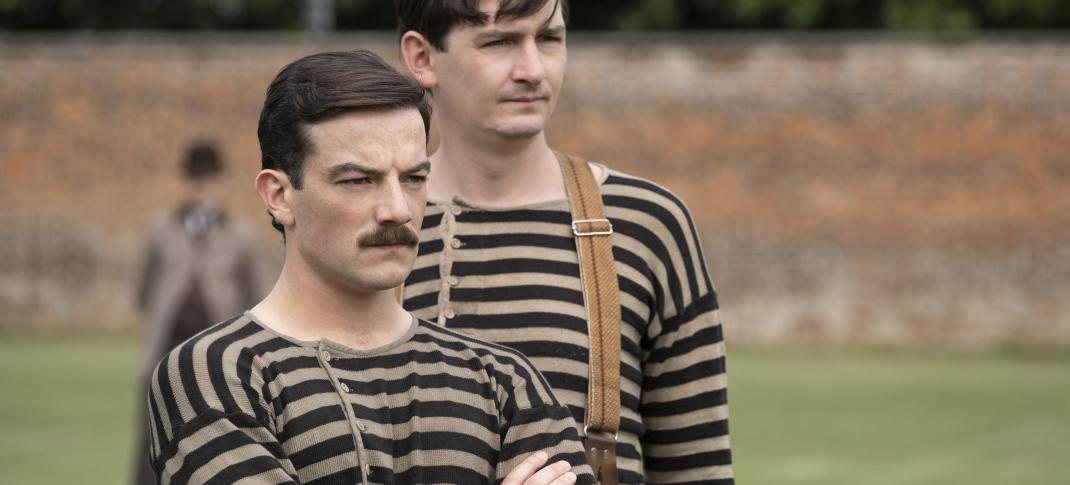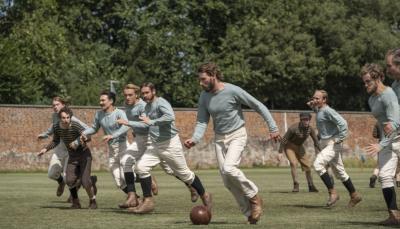Netflix’s 'The English Game' is a Charming Story That Goes Beyond Football

Julian Fellowes turns from Highclere Castle to the football pitch with The English Game, a period drama that ostensibly exists to tell the story of the origins of the sport we Americans now call soccer, but which spends just as much time exploring issues of class and inclusion as it does the art of passing.
The English Game is set in 1878 and follows the story of two very different men. Arthur Kinnaird (Edward Holcroft), the brash, wealthy captain of the Old Etonians, heads a group of generally aristocratic snobs who play football as their general means of exercise and who all sit on the board of the Football Association that makes the rules of the game. Fergus Suter (Kevin Guthrie), a Scottish player from Glasgow, has been hired by a local mill owner and given additional wages to play for the town’s team in an attempt to skirt the rules about involving supposedly “professional” competitors in their previously amateur league and given their decidedly non-aristocratic supporters something to believe in.
The rise of working-class teams is but one of the sea changes in football that The English Game attempts to explore. From paid players and geographically-based travel challenges to hooliganism and merchandising, the growing pains of the sport are laid bare for all to see.
Given that The English Game is a Julian Fellowes production, however, there’s not a tremendous amount of nuance to its various stories, whether we’re talking about the snotty upper-class footballers who resent the intrusion of millworkers into what was once considered a gentleman’s game, or the messy, rough and tumble tryhards that make up the majority of the Darwen and Blackburn teams. You pretty much know going in what’s going to happen – and the show doesn’t mind that at all, given that one of its very first lines basically says that Suter’s style of play will revolutionize the game one day. (Spoiler alert: It does. The titular English game will eventually become everyone’s game, thanks to the emergence of passing as a scoring tactic.)

There really isn't a lot in the way of surprises and the story basically unfolds the way you expect it to, but that doesn’t mean it isn’t a compelling one in the end. But, like every Fellowes story, the thing that makes The English Game appealing is its characters and the ways that they are used to poke at various issues of class conflict.
Strangely enough, the most boring aspect of the show is the football itself, which generally consists of a bunch of largely indistinguishable men running around a ridiculously vibrantly green field. Thankfully the games themselves are rather fewer in number than you might expect going in given the series’ title, and much of the show is actually focused on class issues, several rather charming romances, and a raft of generally interesting and likable secondary characters.
Kinnaird begins the story as a snotty toff, but actually turns out to be a rather forward-thinking progressive with an incredible wife. Fergus is a striver who loves the sport of football, but who also understands that his game is also a profession, and a way of saving his mother and sister from an abusive living situation. The supposed rivals actually turn out to both be decent and likable people, brought together by talent and love of the sport.
But, in a pleasant surprise, it turns out that it’s really The English Game’s women who steal the show. The Spanish Princess star Charlotte Hope gives an understated and moving performance as Kinnaird’s wife Alma, a thoughtful, opinionated woman who feels ahead of her time from her very first scenes

She and Kinnaird are a charming pair together, the rare period drama couple that feels like a true romantic partnership in both word and deed. As they struggle with the emotional impact of a late-term miscarriage, the Kinnairds work together to determine what their lives will look like going forward, and their give and take with one another is honestly lovely to watch.
Jamestown actress Niamh Walsh is also a standout as Martha Almond, a no-nonsense working-class single mother struggling to provide for her daughter in a world that looks down on her as a fallen woman thanks to her previous relationship with a very married man. Her slow-build romance with Fergus is somehow utterly charming despite being incredibly predictable, and though The English Game is a little too fond of painting its hardscrabble mill town residents as adorably quaint rather than truly downtrodden, Martha’s clear-eyed realism is a breath of fresh air.
If you’re expecting The English Game to be Downton Abbey but with some sports thrown in, you’re going to be disappointed. This isn’t a groundbreaking, addictive sort of drama. It is a slow, meandering story that’s full of many of Fellowes’ favorite twists and tropes, but at the end of the day lacks many of the clearly drawn supporting figures that made Downton so popular. That said, it will likely appeal to the underdog enthusiast in all of us – it’s why we watch sports movies, after all - and its female characters are wonderfully complex and likable, not something that’s at all generally guaranteed in a story like this. Plus, at just six episodes, it’s a perfect weekend binge.




